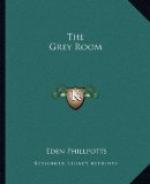They were, however, not betrothed when the war burst upon Europe, and Henry, then one-and-twenty, went from the Officers’ Training Corps to the Fifth Devons, while his cousin became attached to the Red Cross and nursed at Plymouth. The accident terminated their shadowy romance and brought real love into the woman’s life, while the man found his hopes at an end. He was drafted to Mesopotamia, speedily fell sick of jaundice, was invalided to India, and, on returning to the front, saw service against the Turks. But chance willed that he won no distinction. He did his duty under dreary circumstances, while to his hatred of war was added the weight of his loss when he heard that Mary had fallen in love. He was an ingenuous, kindly youth—a typical Lennox, who had developed an accomplishment at Harrow and suffered for it by getting his nose broken when winning the heavy-weight championship of the public schools in his nineteenth year. In the East he still boxed, and after his love story was ended, the epidemic of poetry-making took Henry also, and he wrote a volume of harmless verse, to the undying amazement of his family.
For Mary Lennox the war had brought a sailor husband. Captain Thomas May, wounded rather severely at Jutland, lost his heart to the plain but attractive young woman with a fine figure who nursed him back to strength, and, as he vowed, had saved his life. He was an impulsive man of thirty, brown-bearded, black-eyed, and hot-tempered. He came from a little Somerset vicarage and was the only son of a clergyman, the Rev. Septimus May. Knowing the lady as “Nurse Mary” only, and falling passionately in love for the first time in his life, he proposed on the day he was allowed to sit up, and since Mary Lennox shared his emotions, also for the first time, he was accepted before he even knew her name.
It is impossible to describe the force of love’s advent for Mary Lennox. She had come to believe herself as vaguely committed to her cousin, and imagined that her affection for Henry amounted to as much as she was ever likely to feel for a man. But reality awakened her, and its glory did not make her selfish, since her nature was not constructed so to be; it only taught her what love meant, and convinced her that she could never marry anybody on earth but the stricken sailor. And this she knew long before he was well enough to give a sign that he even appreciated her ministry. The very whisper of his voice sent a thrill through her before he had gained strength to speak aloud. And his deep tones, when she heard them, were like no voice that had fallen on her ear till then. The first thing that indicated restoring health was his request that his beard might be trimmed; and he was making love to her three days after he had been declared out of danger. Then did Mary begin to live, and looking back, she marvelled how horses and dogs and a fishing-rod had been her life till now. The revelation bewildered her




